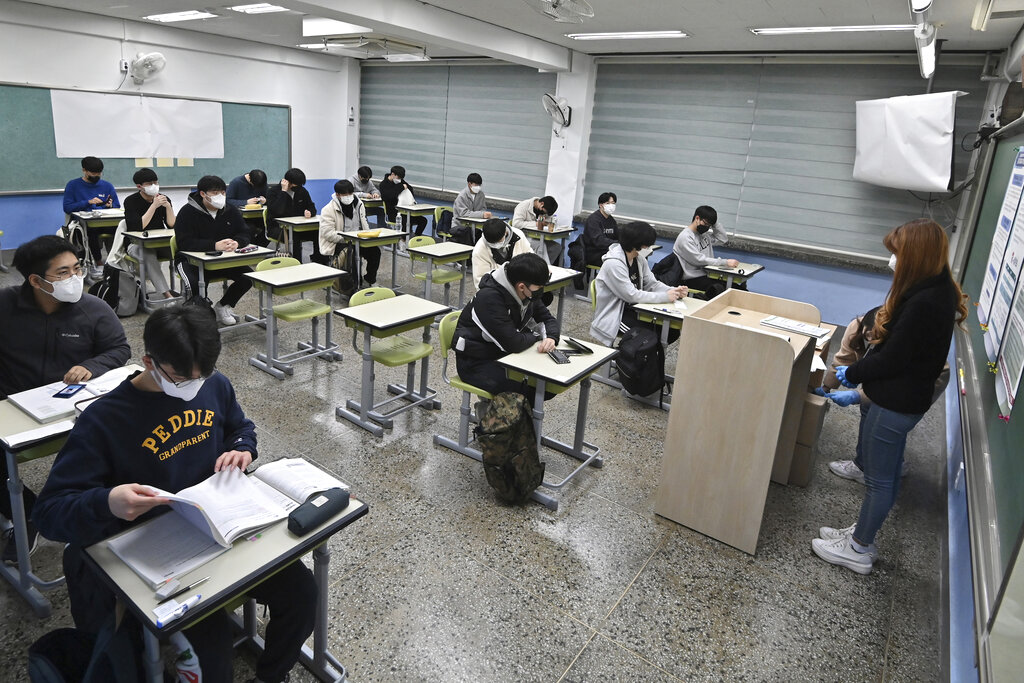FMT:
S. Korea cuts ‘killer questions’ from college entrance exam
The move is part of a bid to reduce reliance on private cram schools.

More than half a million students sit the annual nine-hour test known as ‘suneung’. (AP pic)
SEOUL: South Korea will drop so-called “killer questions” from its notoriously tough college entrance exam in a bid to reduce reliance on private cram schools, the education ministry said today.
More than half a million students sit the annual nine-hour test, known as “suneung”, which plays a crucial role in deciding a student’s college, career and even marriage prospects.
The inclusion of “killer questions”, which cannot be answered by simply studying the curriculum taught at state schools, was meant to help distinguish top students.
But it has created an arms race of extra educational spending as parents and students flock to expensive private tutoring centres known as “hagwons” to get ahead.
“I will do everything I can in my capacity as the education minister … to exclude questions outside of the public education system to make the test a fair test,” education minister Lee Ju-ho said yesterday.
Today the education ministry told AFP it would press ahead with the reform, saying it “stood by” Lee’s comment.
Previous efforts to change the system have flopped, including an attempt this year to remove “killer questions” from the mock exam.
The importance of the test is reflected in extraordinary measures that authorities take to prevent any disturbance, including suspending take-offs and landings at airports during the English listening test.
Enormous pressure placed on students in South Korea’s ultra-competitive education system has been blamed for teenage depression and suicide rates that are among the highest in the world.
Lee said officials should “reflect on themselves” for previously failing to address the test’s difficulty, which he called the “driving force” behind explosive growth in private education.
While the government stood idly by, the pockets of cram schools “got fatter”, he added.
South Korean households spent more than US$20 billion on private education for primary, middle and high-school students last year, according to Statistics Korea.
The figure translates to a monthly average spend of US$320 per student.
SEOUL: South Korea will drop so-called “killer questions” from its notoriously tough college entrance exam in a bid to reduce reliance on private cram schools, the education ministry said today.
More than half a million students sit the annual nine-hour test, known as “suneung”, which plays a crucial role in deciding a student’s college, career and even marriage prospects.
The inclusion of “killer questions”, which cannot be answered by simply studying the curriculum taught at state schools, was meant to help distinguish top students.
But it has created an arms race of extra educational spending as parents and students flock to expensive private tutoring centres known as “hagwons” to get ahead.
“I will do everything I can in my capacity as the education minister … to exclude questions outside of the public education system to make the test a fair test,” education minister Lee Ju-ho said yesterday.
Today the education ministry told AFP it would press ahead with the reform, saying it “stood by” Lee’s comment.
Previous efforts to change the system have flopped, including an attempt this year to remove “killer questions” from the mock exam.
The importance of the test is reflected in extraordinary measures that authorities take to prevent any disturbance, including suspending take-offs and landings at airports during the English listening test.
Enormous pressure placed on students in South Korea’s ultra-competitive education system has been blamed for teenage depression and suicide rates that are among the highest in the world.
Lee said officials should “reflect on themselves” for previously failing to address the test’s difficulty, which he called the “driving force” behind explosive growth in private education.
While the government stood idly by, the pockets of cram schools “got fatter”, he added.
South Korean households spent more than US$20 billion on private education for primary, middle and high-school students last year, according to Statistics Korea.
The figure translates to a monthly average spend of US$320 per student.
It's standard practice in countries that still take exams seriously to throw in a few questions that only the Top 1% of students will be able to answer.
ReplyDeleteTo separate the cream.from the average.